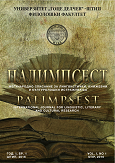AFFECTIVE VARIABLES IN THE FOREIGN LANGUAGE LEARNING PROCESS
AFFECTIVE VARIABLES IN THE FOREIGN LANGUAGE LEARNING PROCESS
Author(s): Vesna Prodanovska-Poposka, Marija TodorovaSubject(s): Social Sciences, Language and Literature Studies, Education, Foreign languages learning, Pedagogy
Published by: Универзитет »Гоце Делчев« - Штип
Keywords: Affective variables; Foreign language learning; Affective Filter Hypothesis.
Summary/Abstract: Emotions significantly affect the process of foreign language teaching and learning. Some of them have a positive impact and facilitate the learning and the ability to memorize, and others have a negative impact and ‘block’ or debilitate the learning process. Native language proficiency, language aptitude, attitudes and beliefs, affective variables, demographic features (age, gender), etc., are already well-established influential factors related to foreign language learning. The authors of this paper actually attempt to scrutinize the affective variables i.e. anxiety, motivation and self-esteem among university students-learners of English and Spanish as foreign languages. The paper presents testing of the Stephen Krashen’s Affective Filter Hypothesis by surveying a group of students in order to determine the presence of anxiety, to evaluate the level of motivation and self-esteem, thus confirming or refuting Krashen’s Affective Filter Hypothesis. According to the obtained results of the aforementioned analysis of both groups of FL students, it is well established that the Affective Filter Hypothesis is partially confirmed.
Journal: Палимпсест, Меѓународно списание за лингвистички, книжевни и културолошки истражувања
- Issue Year: 8/2023
- Issue No: 15
- Page Range: 261-271
- Page Count: 11
- Language: English

